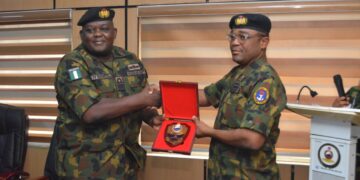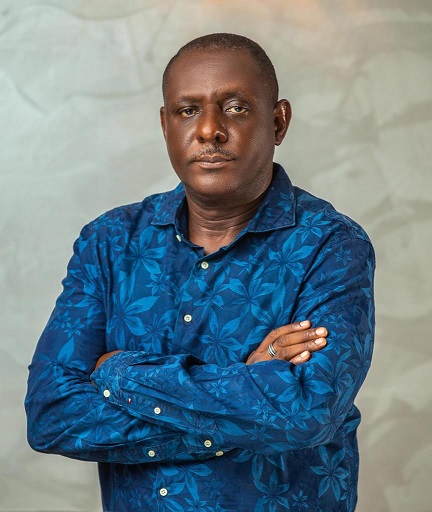On this edition of ‘CEOs Talk Business’ Captain Emmanuel Iheanacho, Chairman, Genesis Worldwide Shipping Nigeria Ltd., talks on reasons his company has taken up building of a Container terminal as well as an off-dock facility.
It is a huge investment, but Iheanacho talks about why the investment consideration.
Revolutionalizing supply chain logistics
Traffic gridlock in Apapa Port City has become like a natural feature; at various times through the years, trucks carrying containers spend days, sometimes weeks on the queue, just to get into the Lagos ports. The situation actually got remarkably worse in 2018 when truck drivers practically lived inside their trucks for long weeks running into months. While many factors were blamed for the development including deplorable portions of the roads, the Federal Ministry of Works in collaboration with the Nigerian Ports Authority, Dangote, and Flour Mills Nigeria Ltd., rebuilt failed portions of the road descending into Apapa from Ijora. That project cost an estimated N4.34 bn. Sadly, that did not fix the problem. So, businesses continue to suffer losses as trucks still spend days and sometimes weeks on the queue just to get into the ports.
While a 2020 Data available from the Nigerian Ports Authority (NPA) show that Apapa Port alone received 632,148 TEUs of container traffic, it gives an insight into the number of trucks that have to make their way into and out of the Port.
In all of these, Chairman Genesis Worldwide Shipping Company Ltd., Captain Emmanuel Iheanacho, believes that there had been a gap in infrastructural development to handle container volumes, in addition to workable modalities that could help ease the problem. Therefore, his company has made a business decision to diversify into building a container terminal and an off-dock facility in a strategic location to help shippers move their container cargoes with ease and away from the persistent Apapa gridlock. Iheanacho talks about this new project and how it would support shippers.
Apapa gridlock and need for infrastructural development
The problem has been there and you have a long-run solution and a short-run solution. The problem is that the infrastructural development has lagged in trade. So, basically what we are talking about is to have an efficient port system where ships bring goods into the Nigerian ports. Those goods are seamlessly discharged and taken by road transport or by rail inland to people who consume those goods. So if there is a disconnect between the estimation of the volumes that are coming in and the volumes that are going out, then we will start having the problem that we have endured; problems in terms of congestion, problems in terms of the inconvenience that it had caused, problems in terms of the extra costs of doing business, problems in terms of the fact that your money is not really going far, because your money is paying for those inefficiencies that have become apparent.
So what we have done or what we are doing currently to try and contribute our own quota to finding a resolution to the longer problem of congestion in Apapa Port, is that we are trying to build logistics infrastructure that avoids entry into Apapa ports.
Basically we own a property here in Lagos and going to develop a Container Terminal thereon. And the idea really is to create a facility that Ships can bring containers from foreign countries and land them in that Island, and we can then transship those cargoes using badges to a place such as Ikorodu or Itoikin. And we have Customs permission and authorization to move those cargoes from the point of first discharge unto the off-dock location. So this is what we are doing. We have started the construction, building the off-dock. And when the off-dock is ready, we will now come back here to the main dock itself, because that’s a major investment commitment, because it requires us to build docking facilities to hold or to receive panamax size vessels; that is to say that vessels that are about 265 metres long, vessels that draw a draught of about 14 m. So, we’ll have to build a dock that is big enough, sufficient and well founded to host these vessels. We will have to equip the adjacent cargo storage areas with adequate cargo handling equipment, cargo handling gantries to remove cargoes from the ship, trucks to carry landed containers and then to put them in storage. We would have to designate and segregate the cargoes that are coming in – in terms of laden cargoes, empty cargoes, agricultural products going out, containers requiring refrigeration, and all of those things. So, it is indeed a major investment commitment.
Would your company provide trucking services for movement of the containers out of the facility?
We can’t really do that all alone, we just wouldn’t do that. It will be sufficient for us to manage the container throughput through the terminal, then of course to move the containers. It is way different from what you see currently, because part of the congestion that you have in Lagos is caused by too many road trucks coming in and out of Lagos. So we want to avoid that entirely. We want to create the choice for the international trader. So that they can actually have access to their goods without joining that debilitating queue that forms on an everyday basis for people who come to do business at the Port.
Don’t you think that a rail line connecting such a facility would be of greater good?
Yes, of course. A rail line is quite expensive. We are not going to invest in building rail facilities going out of the Port. That is a major investment that is better handled by the government.
Would you consider such a partnership with the government?
Yes, if there is a possibility that we could partner with the government in developing it. The good thing about such partnership is that government has the resources, can facilitate all the approvals for the development and the private sector person would really bring in benefits of good and efficient management, to try and get the very best for that kind of investment.
But our own structure as conceived totally obviates or departs from the requirement for us to bring the truck from inlands to Lagos. What we want to do is to subscribe to a more efficient use of our inland waterways, so that the goods would be transported first from a foreign ship unto our Island terminal. We would then requisition the services of barges, and we would load all the goods unto barges and we will take the barges unto our terminal in Itoikin. And where we would have Customs, all the different agencies that would normally attend to import and export cargoes in the Ports would be available. Of course, we would be equipped with prior authorisation from the Customs to move the goods under bond. So, we would move them there and instead of coming out to add to the congestion in Lagos, you go to Ikorodu and you clear the goods and off you go; you are on the expressway to Ijebu-Ode and you are going to the East or where ever it is that you are going to.
For the barging operations, would you be handling that as well?
No. I know of a number of barge companies who are standing ready to do the job, so we would not get involved with the barging operations; certainly not in the first three years of the operation. We would not get involved, unless there is a requirement for us to improve the efficiency of the movement of those containers, then we could actually intervene by investing in our own barges. But in the interval, we intend to use barges that belong to third party operators to move these cargoes.
Let’s talk about financing. How much is this project looking at?
It is actually huge to be honest. That has been the major drawback that we have had. If you are conceiving of a project that would set you back about N10bn, then for you to borrow it at the rate of 20 per cent, 21, 22 per cent interest rate, then you know it is really a very risky undertaking. But If you were to have access to special funds that are maintained by the Central Bank, real sector financing, which should be available to business people at single-digit interest rate, then it becomes something that we need to seriously look at.
The Bank of industry is there, Central Bank is there, a combination of Central Bank and Bank of Industry, so many banks that you can get those resources from.
Does the AfDB not do any of such business financing?
They do.
Have you looked to that area?
No. We are looking at all of them. We are not really forced as to where we get the money from. But all we want is the terms upon which the money would be lending to us.
Which one of these financing institutions has been quite promising?
There are quite a few of them; AFREXIM is there, the AfDB, NEXIM, so quite a lot of them. What we would do when we get to the point of looking for additional finance for business, we would have to requisition the services of people who are experts in this business. They know all the possible banks, they know what these people require, so they really cut the search short by their pre-knowledge of the requirements, which they get ready and then to add your own specific information and then they can m lodge the application on your behalf. This is what would happen when we get to that point.
So, what other requirements have come in easy or difficult?
There are specific requirements for any of the approvals you might want to add; some require that you present yourself for proper scrutiny; for instance you have to have EIA (Environmental Impact Assessment) with respect to any of the physical infrastructure that you want to develop. And the job of the Ministry of Environment is to evaluate what you want to do in relation to what might happen when you do it in the environment. So, if you take time to study the requirements for each of the agencies that you interact with, then you will have time to prepare yourself and make sure that all these basic requirements are met. It is not impossibility, not at all. You just have to remain focused on what needs to be done. We haven’t had any extraordinary problems in terms of that. You sit down and say ok, you want to do this. You have to get authorization from these agencies, they require such documents. You get those documentation together, check and cross-check and you send them forward. And after they have read the documentation in the first instance, they would subsequently invite you. If there are any modifications they would want you to make to any of your proposals, they would indicate and you would go ahead to make the modifications and they would give the authorisation and you proceed.
Do you have concerns with manpower for this sort of project you are going to be handling?
Whatever skill you require, that is the good thing about business, you don’t have to know everything. So, whatever skills you require, as long as you can define it, you can find somebody who has been there before. You can go on the Computer. You can have a look in Linkedin, and then you google the skills that you are looking for and then you will see a lot of people who have done the same that you want to do and you contact them and bring them, and set terms for their participation for your development.
With these, how soon can we come around to have a look at what you are doing?
Well this things that we keep getting involved in , are long …investment, so for instance, to build the main terminal , we would be talking about one and half years to two years because it involves serious physical construction objectives; piling, all kinds of things. So, we intend to adopt a kind of phased development; we are not going to start and say ok we are just going to continue until one and half years is ready. No, once the dock is ready, once a laid down area is there, once we are able to afford a number of cargo handling equipment, we are there, so we will start. And as we earn more money as we operate, we will continue to invest in the business.
What is the capacity of the off-dock facility?
The development for containers is actually conceived on a 20-hectare area.
It is a huge area, it has capacity to accommodate more than 10,000 containers in transit at any one time. And the interesting thing is that we have additional capacity for function and Growth because of the way it has been arranged. So, it would contribute to a great extent to ameliorating problems of congestion that we have in Apapa today.
A lot of containers will be received and warehoused in the Island. A lot of containers would be moved to and from the Island. A lot of current traffic from import and export of goods will be taken off from the roads, starting from Lagos roads and it would create proper relief for the system, I think.
































































